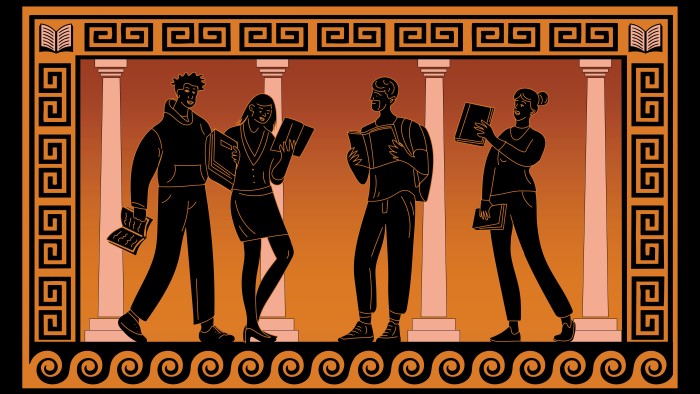Unlock the Editor’s Digest for free
Roula Khalaf, Editor of the FT, selects her favourite stories in this weekly newsletter.
The writer is a professor in the department of classics and ancient history at Durham University
A striking mixture of bad and good news has broken recently about the teaching of classical subjects in England’s state schools. Misery greeted December’s announcement that the Latin Excellence Programme (LEP), funded by the central government since September 2022, will be cancelled mid-academic year. A thousand state-sector candidates for the Latin GCSE in more than 40 schools, many in economically deprived areas and due to take exams this summer, will suddenly have no funded teachers or trips. Thousands of others, studying Latin from the age of 11 upwards, will lose access to the subject.
But abundant good news about classical subjects risks being drowned out by this sad story. There are hopeful signs that enthusiasm for the ancient Greeks and Romans in the state sector has begun to expand significantly. While the numbers taking GCSE and A Level qualifications in ancient languages are tiny and stagnant, the last few years have seen a steady, steep and unprecedented increase in the numbers enrolling for GCSE and A Level courses in both Classical Civilisation and Ancient History.
These qualifications hone interdisciplinary skills by providing access to the ancient Greek and Roman worlds, in the round, through a rich variety of sources. Students can begin them from scratch at either GCSE or A Level — no prior knowledge or language skills are required.
Highly respected by universities and employers, these courses are easier for schools to provide because they can be taught by teachers qualified in any academic subject. They could therefore potentially be offered to every pupil in the land at minimal cost. Teachers of these subjects have often originally trained as specialists in English, Modern Languages, History, Philosophy/Religion or Drama, but also in such other, disparate disciplines as Physics and Geography, even in Sports Science and Business Studies.
The growth in appetite for these courses is partly a result of a national campaign based here at Durham University, Advocating Classics Education. We were frustrated with the situation where 93 per cent of our teenagers — those who attend state-maintained schools or sixth-form colleges in which Ancient Greek and Latin language qualifications are almost invariably unavailable — are excluded from studying antiquity.
The benefits of immersion in the ancient world should be available to all. The most obvious and immense is cultural literacy: students come to understand the significance of key figures and events in world history and literature during the period of unprecedented intellectual progress from the last millennium BCE until the end of the Roman empire. An astonishingly diverse range of sources, including art and architecture, coinage, philosophy, biography, history, drama, oratory — train students in evaluation, especially the critical interrogation of the reliability of evidence. Dissecting propaganda and weighing the competing authorities at work in a complex society are skills sorely needed in the era of Fake News.
Great ancient speechmaking sharpens students’ ability to articulate arguments. Familiarity with the multicultural worlds the Greeks and Romans shared with their neighbours in Africa, Asia and northern Europe enhances understanding of competing identities — ethnic, national, linguistic, federal, European, colonial, imperial, cosmopolitan and religious. Classics imbues its students with political sophistication by addressing the original development of ideas about democracy, republics, empire and citizenship. It confronts ancient forms of slavery, elitism and patriarchy.
The prematurely cancelled Latin scheme’s provider, Future Academies trust, won the public tender process and has met all the Department for Education’s key performance indicators; lack of money is the sole reason for the DfE’s decision. The scheme’s abrupt truncation is cruel and causing chaos. Yet it was only ever envisaged to run for a maximum of four years.
But the other flourishing classics courses offer hope — and there are other flickers of light. A new All-Party Parliamentary group dedicated to promoting classical subjects in schools is chaired by Peter Swallow — he is a former PhD student and subsequently colleague of mine at Durham. We hope for serious changes in policy designed to expand provision in classical subjects much further in the very near future.
The ancient world, however brutal, produced art, thought and literature of breathtaking profundity and beauty and offers an aesthetic and emotional experience like no other — it must be open to all our young people.



